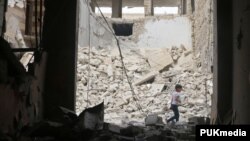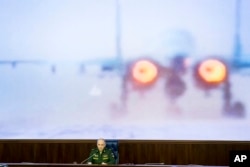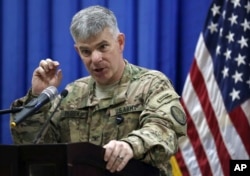Russian artillery units were involved Wednesday in fighting in Syria's divided northern city of Aleppo in the fiercest ground clashes in a year between rebel groups and Assad regime forces in the area, which has suffered two weeks of blistering government airstrikes. It is the first time Russian ground troops have assisted Syrian government forces outside the coastal province of Latakia or at Palmyra, say rebel commanders.
The development came as the State Department said the U.S. and Russia reached an agreement to extend a "cessation of hostilities" in Syria to Aleppo while acknowledging that "there have been reports of continued fighting in some locations."
Dozens were killed as rebels advanced into Syrian government-controlled western districts, according to political activists. The insurgents were forced to withdraw after several hours of intense fighting.
The assault was mounted to disrupt regime forces, say rebel commanders who have long warned of a major offensive in the coming weeks to wrest back the battered insurgent-held districts of a city that remains a key battlefield prize for the government. The clashes come amid diplomatic efforts in Berlin to stop the fighting.
The Western-favored Syrian National Coalition, the umbrella anti-Assad opposition group, accused Russia of deceiving the international community, arguing that Russian participation on the ground and in the air contradicts Moscow’s claims that it is eager for a resumption of a partial cease-fire agreed to in late February.
Russian warplanes have been leading the government aerial bombardment of rebel-held areas of Aleppo since April 21, opposition politicians say, further highlighting the falsity of Moscow’s involvement in talks about cease-fires or political solutions to the five-year-long civil war.
“Russia is deceiving the international community by falsely claiming it supports a political solution in Syria,” says Nora al-Ameer, a member of the SNC’s political committee. “Russians pretend to engage positively with the United Nations efforts to reach a political solution in Syria while supporting the Assad regime in its ongoing brutal onslaught on Aleppo."
"The Assad regime, backed by Russia, is exploiting negotiations to pursue a military solution on the pretext it is fighting terrorism,” al-Ameer added.
Russian spokesmen say al-Qaida fighters, who were not included in the U.S.-Russian brokered cessation of hostilities deal finalized in February, allied to other rebel groups, are at fault for the violence in Aleppo, saying that the assault by insurgents disrupted negotiations for a temporary truce in Aleppo that had nearly been complete.
Defense Ministry spokesman Igor Konashenkov was quoted by Russian news agencies as saying that a "regime of calm" in Aleppo that had been due to take effect was shelved following the deadly ground assault.
Rebels dismiss Moscow’s claim, saying that the regime has remained focused on Aleppo and its two-week-long aerial bombardment of the city is a softening up ahead of an inevitable ground assault.
The regime bombing, says Hawass Khalil, an SNC politician, is “aimed at intimidating the civilian population and forcing them into submission …and provides further proof that the Assad regime is not a serious partner in negotiations.”
U.S. Secretary of State John Kerry has said American and Russian negotiators are working with United Nations officials to restore the cessation of hostilities deal brokered by Washington and Moscow in February.
“Our teams, on a military-to-military basis, are working through the details that need to be implemented so that this can be restored,” Kerry said Tuesday. He made the comments a day after holding emergency talks in Geneva with U.N. Special Envoy for Syria Staffan de Mistura.
The Syrian Observatory for Human Rights, a Britain-based pro-opposition monitoring group, said rebel rockets killed 19 civilians in government-held portions of the city, including an unspecified number at the al-Dabit hospital, which was badly damaged Tuesday after an insurgent-fired shell struck the fuel tank of a military vehicle near the maternity hospital, the sixth medical facility to be impacted by the fighting and airstrikes.
The other five clinics were hit by government forces, including a hospital run by the French charity Médecins Sans Frontières (MSF), which was struck last week in an airstrike, killing 55 civilians.
The rebel ground assault in west Aleppo, which started late Tuesday, was mounted by fighters from al-Qaida affiliate Jabhat al-Nusra, as well as Western-favored Free Syrian Army militias and the Islamist group Jaysh Al-Mujahideen. It began after rebels detonated a large bomb in a tunnel underneath an Air Force Intelligence building in the Al-Zahra district of west Aleppo.
Government spokesmen said 70 rebels were killed in the fighting, which was at its most intense around al-Rahman Mosque in the al-Zahra’a neighborhood of the city.
Although repelled by regime forces, rebels maintained Wednesday their rocket fire — much of it indiscriminate, according to the observatory. The monitoring group warned the civilian death toll would climb throughout the day, saying 20 civilians were killed Wednesday morning, including four children and five women, in the shelling by rebel factions on western Aleppo districts.
The intensity of rebel shelling is testimony to insurgent fears that the Russian military and other regime forces, including fighters from the Lebanese Shi’ite movement Hezbollah, are gearing up for a new offensive on the rebel-held portion of the city.
Last week, Col. Steve Warren, the spokesman for the U.S.-led campaign against Islamic State, said regime forces were beginning “to mass and concentrate combat power around Aleppo.”
He added, “It is primarily [the] al-Nusra [Front] who holds Aleppo, and, of course, al-Nusra is not part of the cessation of hostilities. So it's complicated. We're watching it.”
His comment angered rebel leaders, who fear that Washington is ready to turn a blind eye on any regime assault on the city in an effort to salvage something from the collapse of the cessation of hostilities agreement. They insist al-Nusra fighters do not constitute most of the insurgent forces in Aleppo.
Warren’s remarks drew criticism also from rights groups. Human Rights Watch Executive Director Kenneth Roth accused the U.S. of inviting “devastating attacks" on Aleppo by “fixating on Nusra presence.”
U.S. State Department spokesmen insist Washington has not given up on Aleppo, arguing a restoration of the cessation of hostilities elsewhere in Syria would clear the way for one in Syria’s one-time commercial capital.
In an effort to revive the cease-fire, temporary local truces have been put into place in two parts of Syria, the Damascus suburbs and in Latakia; however, political activists reported fresh clashes and airstrikes Wednesday in rebel-held eastern Ghouta near the Syrian capital.








